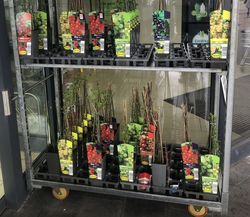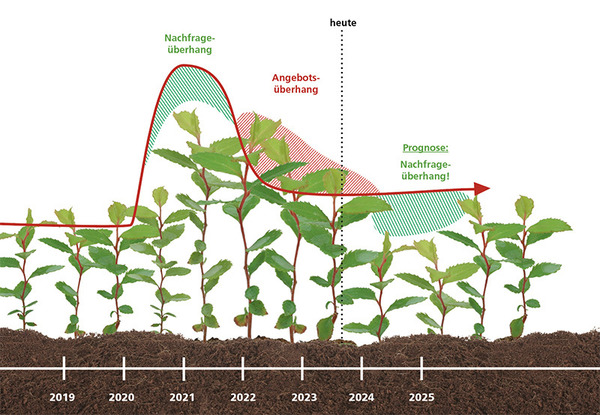 As a seller you are always in a rather uncomfortable situation. Anything you say can be used against you at any time...and it certainly will be used. By the way, this also applies to sellers of (young) plants...
As a seller you are always in a rather uncomfortable situation. Anything you say can be used against you at any time...and it certainly will be used. By the way, this also applies to sellers of (young) plants...
How is this meant? The spoken and unspoken counter-arguments we always have ready when approached by a salesman: "He's only saying that to sell more..." In any case, with a salesperson one will always relate the truthfulness of his or her remarks to the communicative purpose and thus put it into perspective or turn a deaf ear to it altogether.
Of course, this newsletter is no different. One can express it even more drastically: we certainly have to and want to sell; we would like to sell as many berry young plants as possible, that's clear. But it does us little or no good in the medium term if we sell young plants that grow into finished plants – and ultimately find no market.
So what is the actual state of this market that young plant sellers feel directly or rather indirectly? After all, it is ultimately the customers who sell finished plants to this market. And is 'feel' the right, professional term? As Lubera Edibles, we will stick to the word 'feel': on the one hand, we see the data of the young plant sales, but on the other hand, we also have countless conversations with the customers, and all this together gives us a (known, felt and sensed) picture.

Seven theses on the state of the market:
- The demand peaks during the COVID-19 pandemic and the subsequent production exaggerations are over.
- In 2022 and 2023 there was and is an oversupply on the market. It is very difficult to estimate its size. Lubera Edibles assumes that it will be slightly smaller in 2023 than in 2022.
- Retailers, especially chain stores, are taking advantage of the oversupply situation and the simultaneous inflationary trend, increasing sales prices, widening their margins and trying to block price increases at the producer level.
- The sales strategy of chain stores (buy cheap, sell expensive...) is currently not responding sufficiently to consumer trends, which are described in an article below. Higher prices without accompanying clever sales promotion measures tend to curb consumption in a recession.
- Plant producers try to reduce production costs (which naturally rise due to the economic conditions) – this is quite an uphill battle. One way out is to switch from new varieties to 50-year-old old-timers. With this measure, they lose distinctiveness in the market. An equal offer among equal offers will have a hard time breaking out of the depression spiral. The Opel Kadett will not help Opel out of its misery.
- The plant producers are decreasing production, which is absolutely right. But how far should it be lowered? We often have the suspicion that when measures are taken, it is sometimes forgotten that the young plants purchased for 2024 will not be sold as finished plants until 2025. If the current ordering trend for spring and the 2024 potting season continues, there will be too few berry plants on the market in 2025. This is especially true for raspberries.
- Those Lubera Edibles customers who have grown steadily over the last 10 to 15 years owe this, among other things, to the fact that they were almost always able to deliver (even if others were not). However, the risk that can be taken must be assessed wisely.
In the newsletter below, we try to give some help for production planning in addition to insights into our breeding programmes and new plant developments. For example, Lubera analyses the natural, real demand for berry plants and the relationship of the berry fruit species to each other based on the sales figures of their online platform. We also show you some strategies on how to sell more and better even in the current market conditions.
One should never underestimate the power of ideas and arguments. Yes, even if Lubera Edibles, like all the others, only wants to sell...
